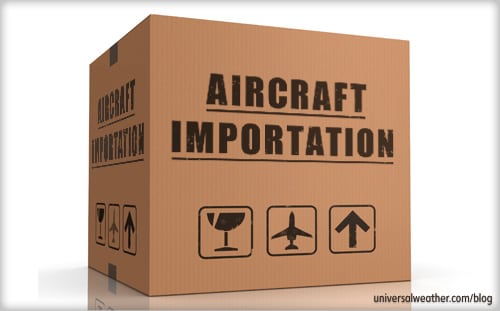3 Must-Knows about Permanent Importation of Business Aircraft into the EU

This business aviation blog post is part one of a two-part article on aircraft importation into the European Union.
If you plan to operate through the European Union (EU) in a non-EU-registered aircraft with EU resident passengers or crew onboard, it’s important to evaluate options of either permanent or Temporary Admission (TA) of your business aircraft into the EU. There’s no one answer that fits all operations. EU taxation is a complex area, and operators are advised to work with their 3rd-party provider and qualified legal counsel.
Here’s some general information you should know about permanent importation:
1. Permanent importation rules have recently changed
Prior to January 4, 2011 the UK allowed aircraft over eight metric tons (17,650 pounds) Maximum Takeoff Weight (MTOW) to be permanently imported into the EU at 0% Value Added Tax (VAT) rate. Previously, the deciding factor in terms of UK VAT exemption had been aircraft weight. This made the UK the obvious country of choice for importation into the EU. Today, the UK has come in line with the rest of the EU. Specifically, imported aircraft are liable for VAT at each country’s current rate, which in the case of the UK is 20%, unless deemed by the governing authorities to be an “airline operating for reward on chiefly international routes,” in which case VAT is 0%.
2. Interpretation and treatment of the EU law varies
The interpretation and treatment of “airline operating for reward on chiefly international routes” varies widely between the EU member states. Simply put, “qualifying aircraft” can be imported into the EU at 0% VAT if operating as an “airline” originally defined under Article 148-E of the Principal VAT Directive. Most countries, however, will not view business aircraft as airlines since local legislation may have different parameters for what is deemed as an “airline.”
The issue has recently been referred to the European Court of Justice (ECJ), where an opinion given by the Advocate General states that the term “airline” is not limited to scheduled airlines and can include business and private aircraft operators. This opinion supports the view that an Air Operator’s Certificate (AOC) can qualify aircraft operations as an “airline” so long as the airline uses the aircraft for business, the aircraft is not exclusively for private non-revenue use of the owner, and the aircraft is available for charter (non-scheduled commercial) flights. The fact that an aircraft owner is transported by the “airline” does not affect 0% VAT status. It is hoped the ECJ will follow the essence of the Advocate General’s opinion when they make their ruling.
The opinion can be found here.
Denmark seems to be the only country to have a looser interpretation of the law at present, which makes it possible to import corporate business jets through this country at net 0% VAT and without the need to hold an AOC.
There are no options anywhere in the EU to permanently import a private ‘luxury’ (not for business use) aircraft without paying VAT.
3. Consult an expert about permanent importation at 0% VAT
If the above is adopted, business aircraft operators holding AOCs may be able to import their aircraft at a zero rate through a number of EU countries, or there is the Denmark route available today, where no AOC is required.
The UK may be a current option for permanent importation, depending on the circumstances of the operation and if the business aircraft can be treated as an “airline” based on governing authorities legislation that has been based on Article 148-E of the Principal VAT Directive.
Conclusion
As there are requirements that must be met for permanent importation into the EU, it is advisable to talk to a specialist lawyer and or a specialist importation broker for more information. Your 3rd-party provider may be able to assist you in getting contact information for those specialists.
Questions?
If you have any questions about this article, contact me at seanraftery@universalaviation.aero.
Next week, we’ll discuss the other half of this topic by focusing on temporary importation into the EU.




